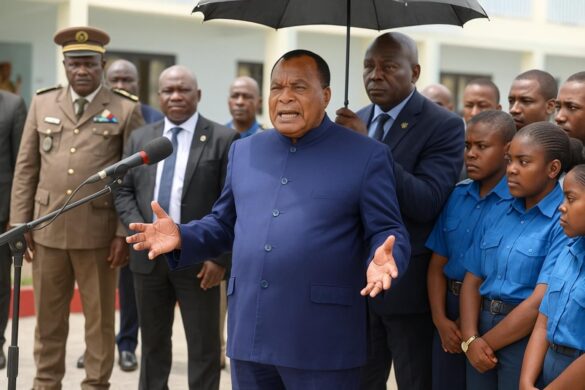Presidential Directive on Public Security
Speaking to journalists after inaugurating the new Liberté school complex in Brazzaville on October 24, President Denis Sassou Nguesso stated that he personally instructed the Directorate General of Presidential Security to help police dismantle so-called “black baby” gangs that are terrorizing several Congolese cities.
The head of state described this order as a matter of national serenity. “Beyond protecting the presidency, the DGSP remains an integral component of the national security architecture and must stand alongside citizens whenever peace is threatened,” he said, citing the decree that created this 2,000-member unit.
Understanding the Kuluna Phenomenon
Local media borrowed the word kuluna from Kinshasa street slang to describe groups of youths brandishing machetes and iron bars. In Brazzaville, they have multiplied since the mid-2010s, operating in dense neighborhoods like Ouenze, Moungali, and Makélékélé, according to police statistics published this year.
Their attacks spare few. Vendors, commuters, and even uniformed officers have reported assaults, while social media regularly broadcasts footage of nighttime robberies.
Why Call Upon the DGSP?
Security experts note that the rapid deployment capability and specialized training of the presidential guard give authorities a tactical advantage where conventional patrols sometimes fail. “Speed and intelligence sharing are crucial in urban anti-gang work,” explained a criminologist.
The DGSP has armored vehicles, drones, and K-9 units rarely available at district stations. By ordering the unit to join police and gendarmerie, the presidency signals its determination without declaring a state of emergency.
Operations Extend Beyond the Capital
Initial raids focused on Brazzaville’s densest neighborhoods, but suspects quickly dispersed along the Congo-Ocean Railway toward Dolisie and into villages of northern Pool, security sources confirmed. Sassou Nguesso said the campaign would follow them: “This is not a flash in the pan; wherever they flee, we will protect our people.”
The Interior Minister later stated on national television that joint task forces have already reclaimed several abandoned houses previously used as kuluna bases, seizing blades, narcotics, and stolen phones.
Community Reactions and Support
At Ouenze Market, a vegetable vendor welcomed the increased presence. “Customers stopped coming at dusk. Now patrols pass every thirty minutes and we close later,” she said, pointing to newly installed solar lamps funded by municipal authorities.
A civil society leader, while applauding the crackdown, urged parallel social programs. “Many of these youths left school early and need options other than crime,” he said during an urban security roundtable.
Balancing Rights and Law Enforcement
Human rights organizations emphasize that operations must respect legal safeguards. The National Human Rights Commission recommended clear arrest protocols and prompt transfer of detainees to judicial authorities to avoid prolonged detention.
